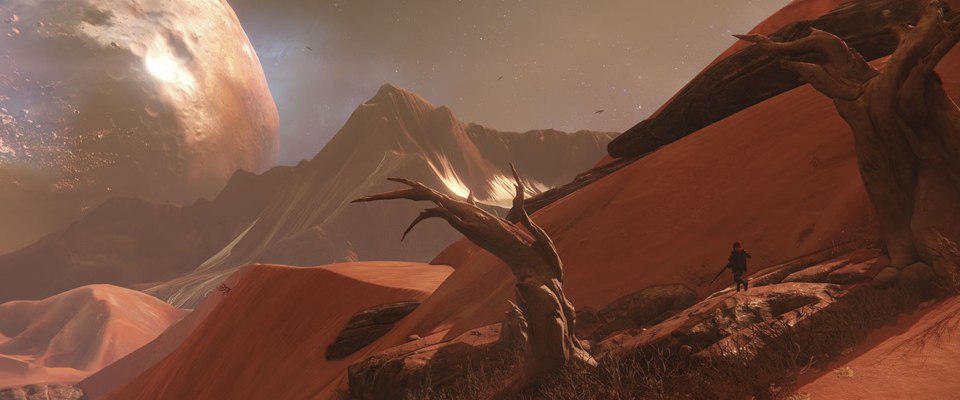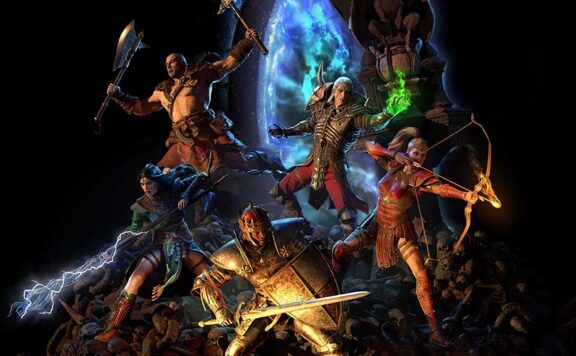It’s the day before the highly anticipated launch of the Destiny Beta test on PlayStation 4 and PlayStation 3, something which will give players an even greater slice of gameplay to explore and experiment with than the Alpha test did back in early June.
However, let’s roll back the clock to E3, where that Destiny Alpha test had just launched. The Alpha launched right in the middle of the week, with some of us trapped out in LA and so having little chance to try the game out for ourselves as we rushed to cover other games, attend appointments and sip margaritas on Santa Monica Pier. Sadly, by the time we had returned home, the Alpha was already at a close, so we kept a little something back for later.
We actually spoke with Bungie Community Manager, David Dague, about Destiny at E3, but while this interview happened right as the Alpha test was launching, we dive right into much of the mythology of the game, the prevalence of certain themes and some of the decisions made with the combat of this expansive new game.
TSA: Destiny’s your grand new Sci-Fi opera, and it’s been out in the open for a while, but it must still be quite a daunting thing to be bringing this new franchise out into the open.
David Dague: Without a doubt. It’s the most ambitious game we’ve ever made and in many respects, it’s the game we’ve always wanted to make. It’s an idea that has been years in the making and the time has finally come.
It’s hard work, there’s a lot we still need to prepare for before we can launch the game, but we couldn’t be more thrilled to have people actually playing it.
TSA: It feels like you have this vast scope, with missions that can head off to Mars or the Moon, but where does it end? How big actually will the final game be?
David: So big that you would need a map to get from one side to the other, but because we’re Bungie, we won’t give you one! We’re going to make you learn your way around.
This is an exploration fantasy. Mankind is finally leaving the protective veil of the Traveller and going out into the wild to reclaim the things that were taken from us when the Darkness came to our solar system and decimated everything that we’d known.
So we really want to instil in the player that sense of wonder and of exploration, that they might be the first people that are exploring some of these destinations, that they’re going to wake up the old ghosts of the Golden Age that have lain dormant for centuries and to rescue those secrets and bring that technology back home so that humanity has what it needs to protect itself and to reclaim our lost worlds.
TSA: What’s the real narrative push that sees us leaving the Traveller’s protection and heading out into the solar system once more?
David: It’s humanity going back on the offensive. For centuries after the collapse of our golden age, all we did was huddle up underneath the Traveller and build a city in the only place that was safe in the universe for us. Now that we’re becoming more powerful and that guardians are learning how to wield the light of the Traveller as a weapon, we can go on the offensive.
We can realise that these attacks are being launched on us from Old Russia, from the Moon, Mars or Venus, and we go back to those places – worlds that were once ours – so that we can reclaim them and make them safe for human life again.
TSA: With the timescale of some of these events, this game is set hundreds of years after the attacks that pushed us back to the Traveller, isn’t it?
David: A lot of that is unknown, simply because things like written history and science were decimated when the golden age collapsed. So, the best that humankind can do to recount their history is with the old stories that are told around the camp fires.
There’s an arcane understanding of the Golden Age, but most of it is just rumour and myth, to be honest. So the first people that leave Earth to be out to the academies on Venus or the buried city on Mars are going to confront their own boogie men, he stories that they were told to scare them into eating their vegetables when they were growing up as children!
This game is all about solving the mystery and exploring places that we’ve always wondered about or imagined, but have never been able to go there. Through player agency, we can send them there to have fantastic adventures.
TSA: There are some notable similarities to previous Bungie games, such as with AIs that have been core to you stories since Marathon. Are these intentional and deliberate similarities, to have this common genus to your games?
David: Yeah, I think Destiny has a lot of themes that we love at Bungie. The central figure is something that the player has full control over, we cast you in the role of the hero, it’s a futuristic tale about protecting humanity against overwhelming odds. It’s a science fiction adventure, but we’re able to infuse this adventure with elements of fantasy and myth. You’re using light as a weapon and behave more like a knight on a quest than a soldier on a mission.
Certainly an artificial intelligence companion that helps light the way and guide your adventure is a great storytelling convention. It’s something that helps us create a great experience for the player.
Perhaps you could consider it an homage to the works we’ve done in the past, but we certainly want to let Destiny live and breath in its own space. Our goal is to give lovers of former Bungie games something that they’ll find instantly relatable, but also immediately surprising in terms of its individuality and what is special about this new creation for us.
TSA: You’ve always had this thing with the numbers 7 and 3, and the fire teams in Destiny are set to three players…
David: [laughs] Yes, for story missions and for Strikes, the three Guardian fireteam is the essential combat unit in Destiny. It’s a great blending of the three archetypes that we’ve built into the game, so when the Warlock, the Hunter and the Titan come together, there’s some very interesting combinations of strengths and abilities.
We made a lot of design decisions in Destiny to make sure that shared encounters make every single participant feel that they’re a crucial ingredient to the action. If your fireteam wins that battle, every single one of them should walk away feeling like that would not have happened if they were not there. It’s also an opportunity for us to let the player look at this game through a different lens. There’s going to be different social dynamics to a three man fireteam, than to the traditional four man squad.
TSA: One thing I’ve always found with co-op games that also want to try and tell a story is that it can be difficult to pick up on a lot of the incidental story telling. A lot of it gets lost when you’re chatting with your mates. How do you go about keeping the depth to the story and the world, but also keeping it simple enough to keep track of even when in a group?
David: I think if anybody is more interested in the story than the the conversation that’s going on with their friends, they always have control over their social interactions with people. The only people whose voices you will hear in this game are the people that you invite to your fireteam.
So if somebody wants to go through and enjoy the story of Destiny uninterrupted by the people who are there, they can go it alone. The story of Destiny is something that you can complete and excel at in a fireteam of one. If I’m playing with my friends, I might tell them, “Alright everyone, shut up because we’re going to learn something interesting.” If you don’t have that sort of control, they either shouldn’t be there or you can play by yourself!
TSA: In terms of the gameplay and combat, it’s quite beholden to the action RPG genre, where you have hit points, health bars above enemies and so on. It’s a genre which can often have quite bullet spongey enemies, but have you tried to balance it to keep the pace and feel that people might expect from a first person shooter?
David: I think we’re balancing the goals of wanting to create an immersive world, but also providing players with feedback. Bungie’s always been about providing players with feedback as to how powerful you are at that moment, where the threat is coming from, how close you are to succumbing to that threat and what you have at your disposal.
We like the player to be extremely informed, so that everything that happens in the world means something to them. We don’t want someone to not understand why they can’t take out a boss.
The combat in this game is more elaborate than some of the straight, immersive, cinematic experiences that we’ve created in the past. If you’re fighting a boss like the Devil Walker, you’re going to need to know that shooting it in the leg is going to be more effective than shooting it in the face. So we’re saving the player a lot of frustration and trial and error by informing them that every combatant has soft targets.
Thanks to David for taking the time to speak to us. If you’re interested in Destiny, the Beta test starts tomorrow for those who pre-ordered or are being given a code by a friend who did. We’ll see you on the Moon.







Tuffcub
I was waiting for for the use of the word “beholden” and I wasn’t let down.